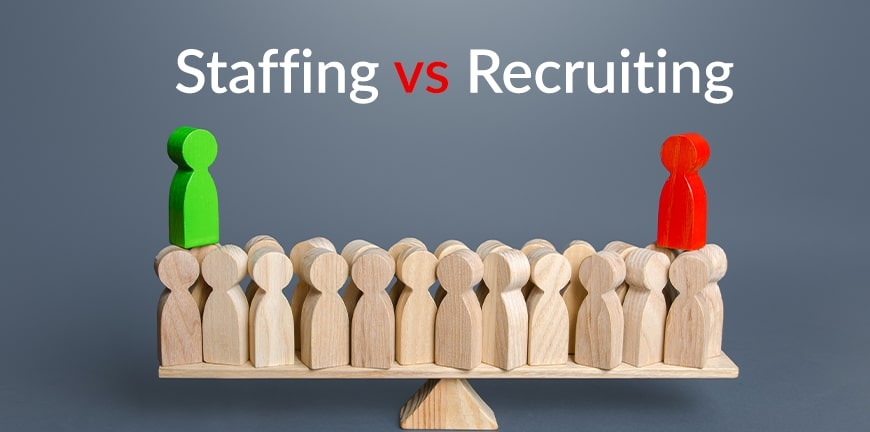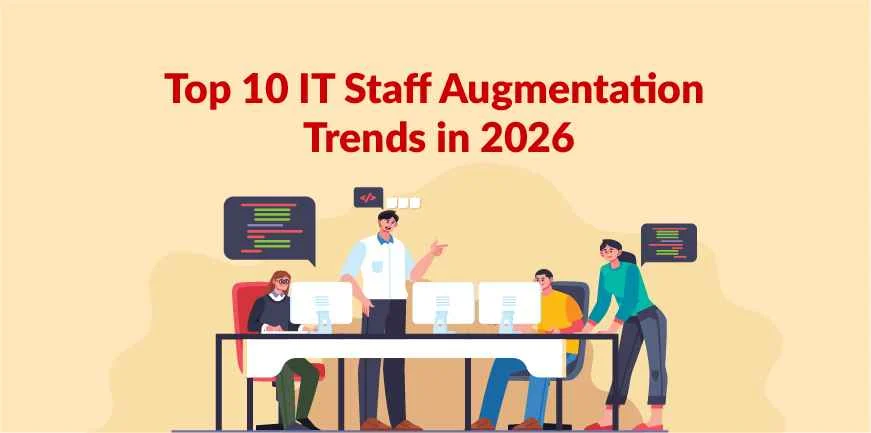
Payroll Structure in India – Components, Types & Benefits
28/07/2022
What are the Global Captive Centers in India? Their Evolving Landscape
10/01/2023- All about RPO vs Staffing
- What Is RPO?
- Benefits of Recruitment Process Outsourcing
- What is Staffing?
- Benefits of Staffing
- How do RPO and Staffing Differ? RPO vs Staffing
- Pros and Cons of both RPO and Staffing
- How to Decide Which One is Best for You?
- How to Choose a Staffing Agency?
- How Do I Choose A Recruitment Agency?
- How To Select A Staffing Agency?
All about RPO vs Staffing
Have you ever been confused about the difference between RPO and staffing? You’re not alone! In this post, we will clear up any confusion and help you understand the critical differences between these two types of employment solutions. Keep reading to learn more!
What Is RPO?
RPO stands for Recruitment Process Outsourcing. It is a Business Process Outsourcing (BPO) where an organization outsources its recruitment functions to an external service provider. The service provider manages the entire recruitment process, from sourcing and screening candidates to onboarding new hires.
RPO providers typically use a variety of sourcing channels to identify candidates, including social media, job boards, employee referrals and professional networks. They also use data-driven methods to screen candidates, such as pre-employment assessments and background checks. Once a candidate has been selected, the RPO provider helps the company with onboarding and orientation.
Benefits of Recruitment Process Outsourcing
RPO can be a cost-effective way to improve an organization’s recruiting process. It can also help organizations access a larger pool of potential candidates, speed up the hiring proces and improve candidate quality. Here are 8 benefits of RPO:
1. Cost savings
RPO might be cost-effective for organizations without internal recruitment resources. RPOs either a flat fee or a portion of each placement. This price system can save firms money compared to traditional recruiting, where they pay for each job post and candidate they interview.
2. Access to a larger talent pool
RPOs have a broader prospect pool than most firms. They employ social media, job sites and professional networks to source candidates. RPO providers use data-driven screening processes to find talented applicants who may not have applied through regular routes.
3. Reduced time-to-hire
RPO can help companies reduce their time-to-hire. RPO providers manage recruitment, from sourcing and screening candidates to onboarding new hires. By outsourcing these functions, companies can focus on their core business activities and leave the recruitment process to the experts.
4. Improved candidate quality
RPO services leverage many sourcing channels to find candidates, improving the quality of recruitment. RPO providers employ data-driven screening processes to locate candidates with the right skills and abilities.
5. Increased efficiency
RPO improves recruiting efficiency. RPO providers source, screen, and onboard candidates. Companies can free up internal resources by outsourcing these functions.
6. Scalability
RPO helps organizations scale their recruitment efforts. RPOs either a flat fee or a portion of each placement. This price structure lets organizations adjust their recruiting budget.
7. Improved employer brand
RPOs can improve employer brand. They employ social media, job sites and professional networks to source candidates. By using an RPO, firms can advertise their employer brand to a wider audience.
8. Increased satisfaction
RPO improves company recruitment satisfaction. RPO providers source, screen and onboard candidates. By outsourcing recruitment, organizations may focus on their primary business.
What is Staffing?
When most people think of staffing, they think of the process of finding and hiring employees to fill open positions within a company. While this is undoubtedly a large part of staffing, it is not the only thing that staffing professionals do. In addition to recruiting and hiring new employees, staffing professionals are responsible for managing employee records, tracking employee performance and handling employee relations issues. Staffing is an essential function within any company, as it helps ensure the company has the right mix of talent to meet its business goals.
Benefits of Staffing
1. Staffing allows businesses to find qualified individuals to fill specific roles within the company. This can help ensure that a business has the right employees to meet its needs and goals.
2. It can improve employee morale and motivation. When a business has staffing in place, employees know someone is available to help them with their work if needed. This can lead to increased productivity and overall satisfaction with one’s job.
3. Staffing can increase customer satisfaction levels. When a business has adequate staffing, customers are more likely to receive prompt service and attention. This can lead to repeat business and positive word-of-mouth marketing for the company.
4. It can help companies can save money. By having staffing in place, a company can avoid the cost of training new employees or the cost of overtime for existing employees.
5. Staffing can improve safety levels within a business. When a business has the staffing, it can provide employees with proper supervision and guidance. This can lead to fewer accidents and injuries occurring in the workplace.
6. It can assist businesses in keeping up with demand. With adequate staffing, businesses can ensure that they have the personnel available to meet customer demands promptly.
7. With staffing, businesses can adjust their workforce to meet changing demands or goals, enabling flexibility. This allows companies to remain agile and responsive to their environment.
How do RPO and Staffing Differ? RPO vs Staffing
RPO stands for Recruitment Process Outsourcing. Staffing is the process of finding and hiring employees. While RPO is a type of staffing, there are some critical differences between the two.
RPO is a type of staffing that involves outsourcing the recruitment process to a third party. This can be done for all positions or just high-level or hard-to-fill positions. The advantage of RPO is that it can save time and money by allowing the company to focus on its core business.
On the other hand, staffing is the process of finding and hiring employees. This can be done internally or externally. If done internally, the company will use its resources to find and hire employees. The company will use a staffing agency to find and hire employees if done externally.
The main difference between RPO and staffing is that RPO is a type of staffing that involves outsourcing the recruitment process to a third party. On the other hand, staffing is the process of finding and hiring employees.
Pros and Cons of both RPO and Staffing
There are pros and cons to both RPO and staffing. Here are some things to consider when making your decision:
RPO Pros:
- More cost-effective than traditional staffing methods
- Focuses on quality over quantity
- Customizable to meet the specific needs of the organization
- Offers a higher level of control over the recruitment process
- Allows organizations to tap into a larger pool of talent
RPO Cons:
- Requires a significant upfront investment
- May not be suitable for all organizations
- Can be complex and time-consuming to implement
- May require specialized skills and knowledge
Staffing Pros:
- More flexible than RPO
- Can be tailored to the specific needs of the organization
- Offers a higher level of control over the recruitment process
- Allows organizations to tap into a larger pool of talent
Staffing Cons:
- More expensive than RPO
- May not be suitable for all organizations
- Complex and time-consuming to implement
- Requires specialized skills and knowledge
When deciding between RPO and staffing, it is essential to consider your organization’s specific needs. There is no one-size-fits-all solution, so it is essential to choose the option that will best meet the needs of your business.
How to Decide Which One is Best for You?
When it comes to RPO and staffing, there are a few things you need to keep in mind to decide which one is best for you. Here are a few tips:
1. Decide your needs
What exactly do you need from an RPO or staffing provider? Do you need help with the recruitment process itself, or do you need access to a larger pool of candidates?
2. Define your budget
How much can you afford to spend on an RPO or staffing solution? Make sure you get quotes from several providers to compare prices.
3. Consider the quality of the candidates
Not all RPOs and staffing providers are created equal. Some will have access to better candidates than others. Make sure you ask about the candidates’ quality before making your decision.
4. Check the reputation of the provider
Take some time to research the reputation of the RPO or staffing provider you’re considering. Check out online reviews and see what other businesses say about their experience.
5. Get a demo
Once you’ve narrowed down your options, get a demo from each provider so you can see how they operate and what they can do for you. This will help you make the best decision for your business.
How to Choose a Staffing Agency?
When choosing a staffing agency, there are a few key factors you’ll want to keep in mind. Here are a few things to look for when choosing a staffing agency:
– A staffing agency should have a good reputation. Make sure to research the agency and read reviews before making a decision.
– The agency should have experience in your industry. This way, they’ll be able to understand your needs better and find candidates that are a good fit for your company.
– The agency should offer competitive rates. Get quotes from multiple agencies before deciding to ensure you’re getting the best value for your money.
– Finally, ensure the agency is willing to work with you on an ongoing basis. You should be able to build a good relationship with your staffing agency to continue using their services in the future.
How Do I Choose A Recruitment Agency?
Working with a recruitment agency can be a great option when it comes to finding a new job or hiring someone for your business. But how do you choose the right one? Here are some things to keep in mind:
– First, consider what job or candidate you’re looking for. There are many types of agencies, so it’s essential to find one that specializes in your field.
– Second, take the time to read reviews and talk to others who have used the agency. This will help you get a feel for their level of service and whether or not they’re a good fit for you.
– Finally, make sure you understand the agency’s fee structure. Some charge by the hour, while others charge a percentage of the salary. Make sure you know what you’re getting into before signing any contracts.
How To Select A Staffing Agency?
There are many staffing agencies to choose from, so how do you know which one is right for you? Here are a few things to consider when making your decision:
Services offered:
What type of positions are you looking to fill? Make sure the agency you choose specializes in the positions you need.
Location:
If you’re looking for local candidates, choose a staffing agency with offices in your area. An online agency may be a better option if you’re open to candidates from anywhere.
Reputation:
Check out online reviews and ask for recommendations from friends or colleagues who have used a staffing agency.
Using an RPO can help reduce the time to fill a position. It can also help you find the best talent for your organization. Compared to that the use of staffing can help reduce hiring costs and increase efficiency.
At the end of the day, both RPOs and staffing provide access to a larger pool of candidates, increasing the chances that you will find the best fit for your organization.
Contact Us For Business Enquiry

Amit Saproo
Amit Saproo is the Head of Operations at ALP Consulting with nearly 17 years of experience in Executive Search, RPO, Leadership, and IT & Engineering recruitment. He leads nationwide recruitment programs across Technology, BFSI, and R&D domains, driving strategic hiring solutions for diverse client needs. Amit excels in building and managing high-performance teams that deliver scalable, end-to-end recruitment and consulting services.




